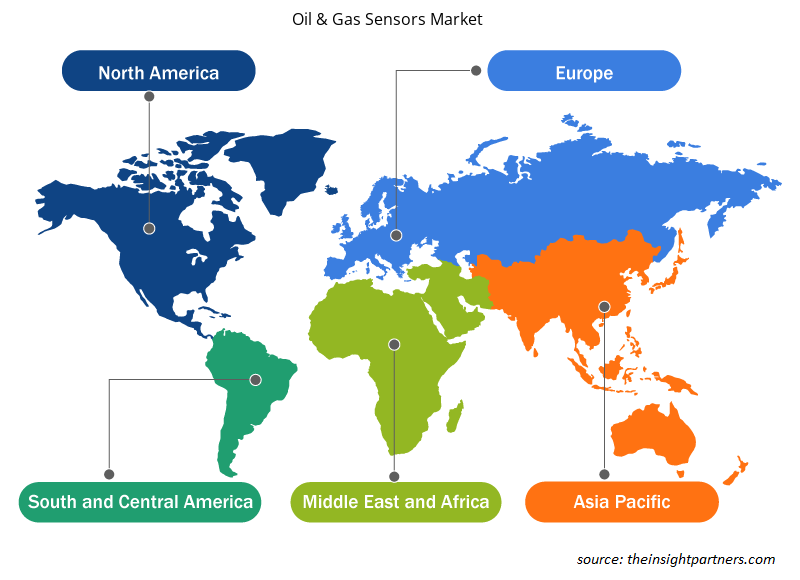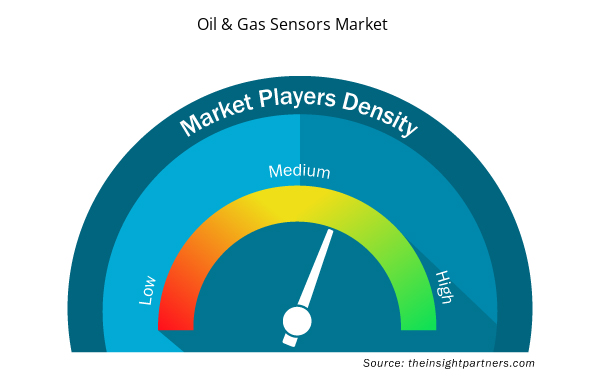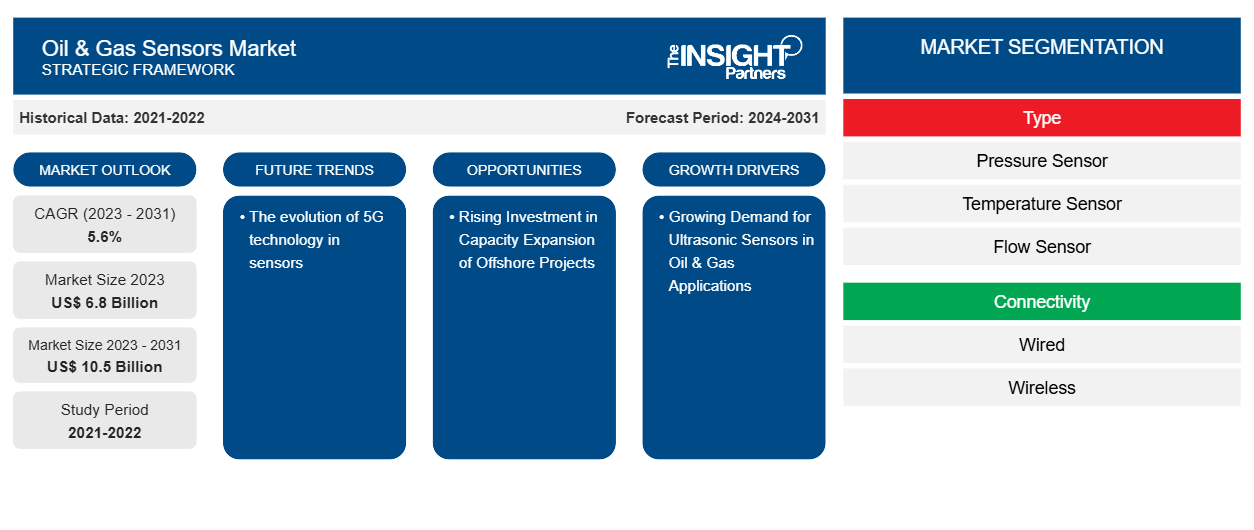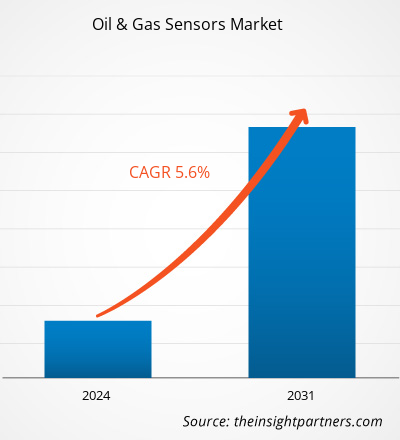预计到 2031 年,石油和天然气传感器市场规模将从 2023 年的 68 亿美元增至 105 亿美元。预计从 2023 年到 2031 年,该市场的复合年增长率将达到 5.6%。5G 技术在传感器领域的发展很可能仍是市场的一个主要趋势。
石油和天然气传感器市场分析
石油和天然气传感器已发现各种上游、中游和下游应用,包括优化管道性能、测量流量、检测泄漏以及通过确保工人安全来防止潜在事故或环境危害。对运营可靠性和效率的不断增长的需求、对潜在危险的早期检测的不断增长的需求、工业自动化的不断提高以及有利的政府举措正在推动石油和天然气传感器市场的发展。此外,不断扩大的石油和天然气行业以及对石油和天然气工厂实时监控日益增长的需求正在推动市场增长。技术进步以及人工智能和物联网等尖端技术在先进传感器开发中的集成对石油和天然气传感器市场的增长做出了重大贡献。
石油和天然气传感器市场概况
传感器检测和测量环境中的物理输入变化,并将其转换为人或机器可以轻松读取的输出。传感器将物理现象转换为可测量的模拟电压或数字信号,然后显示或传输以供进一步处理。石油和天然气等行业使用传感器来监测温度、测量距离、调节压力和检测烟雾等。石油和天然气行业严重依赖传感器来持续监测和测量石油和天然气工厂的工作,以避免意外中断和机器维护。石油和天然气传感器可以承受极高的温度或危险环境,并且具有防爆/本质安全、耐腐蚀、防水/潜水和防尘(IP 级)的特点。这些功能支持石油和天然气行业准确监测油井和管道、海底应用、井口仪表、舵参考以及储罐和油井。
定制此报告以满足您的需求
您可以免费定制任何报告,包括本报告的部分内容、国家级分析、Excel 数据包,以及为初创企业和大学提供优惠和折扣
- 获取此报告的关键市场趋势。这个免费样品将包括数据分析,从市场趋势到估计和预测。
石油和天然气传感器市场驱动因素和机遇
石油和天然气应用对超声波传感器的需求不断增长
随着各国寻求替代的脱碳可再生能源,石油和天然气业务变得越来越重要。然而,对石油和天然气日益增长的需求导致现有基础设施的产量增加,这些基础设施必须更加可靠和高效。为了满足这些需求,富士电机株式会社、霍尼韦尔国际公司、西门子股份公司和村田制作所等石油和天然气传感器公司正在提供超声波传感器,用于在严苛和复杂的工艺条件下测量液体。这些传感器广泛用于各种石油和天然气应用中的远程监控、状态监控和维护、分析和模拟以及流量控制。超声波流量传感器用于上游、中游和下游应用,以计算管道、储罐和其他加工设备中流体的质量流量或体积流量。该传感器还监测设备,例如监测泵、流线、阀门和任何其他需要精确流量来维持石油流动的组件。此外,中游和下游石油和天然气应用对非侵入式测量的需求不断增长,增加了对超声波传感器的需求,用于在炼油和净化过程中监测各种化学反应中的液体体积。这些传感器可以准确监测液体的流动,而不会中断正在进行的操作。
海上项目产能扩张投资不断增加
海上风能和海洋能等海上可再生能源有潜力加速全球能源转型,同时创造新的经济和社会机遇。根据国际可再生能源机构 (IRENA) 于 2023 年 6 月发布的最新数据,2022 年海上风电装机容量超过 55 吉瓦 (GW),而 2021 年海洋能装机容量为 0.535 GW。到 2030 年,由于对海洋能技术的投资不断增加,海上风能和海洋能预计将分别产生 380 GW 和 350 GW。这促进了用户采用石油和天然气传感器来监测水质、检测漏油并评估海上钻井活动对石油和天然气应用的影响。
石油和天然气传感器市场报告细分分析
有助于得出石油和天然气传感器市场分析的关键部分是类型、连接性、功能和应用。
- 根据类型,石油和天然气传感器市场分为压力传感器、温度传感器、流量传感器和液位传感器。压力传感器部分在 2023 年占据了最大的市场份额。
- 根据连接性,石油和天然气传感器市场分为有线和无线。有线部分在 2023 年占据了市场主导地位。
- 根据功能,市场分为远程监控、状态监测和维护、分析和模拟等。远程监控领域在 2023 年占据了市场主导地位。
- 从应用方面来看,石油和天然气传感器市场分为上游、中游和下游。上游部分在 2023 年占据了最大的市场份额。
石油和天然气传感器市场份额(按地区)分析
石油和天然气传感器市场分为五大区域:北美、欧洲、亚太地区 (APAC)、中东和非洲 (MEA) 以及南美和中美。2023 年,北美占据市场主导地位,其次是欧洲和亚太地区。
北美石油和天然气传感器市场的增长归因于石油和天然气传感器在上游、中游和下游应用中的日益普及,其中包括用于监测能源和电力部门使用的设备和设备的运行情况。此外,预计石油和天然气行业的扩张活动将在预测期内为市场增长创造丰厚的机会。
石油和天然气传感器
石油和天然气传感器市场区域洞察
Insight Partners 的分析师已详细解释了预测期内影响石油和天然气传感器市场的区域趋势和因素。本节还讨论了北美、欧洲、亚太地区、中东和非洲以及南美和中美洲的石油和天然气传感器市场细分和地理位置。

- 获取石油和天然气传感器市场的区域特定数据
石油和天然气传感器市场报告范围
| 报告属性 | 细节 |
|---|---|
| 2023 年的市场规模 | 68亿美元 |
| 2031 年市场规模 | 105亿美元 |
| 全球复合年增长率(2023 - 2031) | 5.6% |
| 史料 | 2021-2022 |
| 预测期 | 2024-2031 |
| 涵盖的领域 | 按类型
|
| 覆盖地区和国家 | 北美
|
| 市场领导者和主要公司简介 |
|
石油和天然气传感器市场参与者密度:了解其对业务动态的影响
石油和天然气传感器市场正在快速增长,这得益于终端用户需求的不断增长,而这些需求又源于消费者偏好的不断变化、技术进步以及对产品优势的认识不断提高等因素。随着需求的增加,企业正在扩大其产品范围,进行创新以满足消费者的需求,并利用新兴趋势,从而进一步推动市场增长。
市场参与者密度是指在特定市场或行业内运营的企业或公司的分布情况。它表明在给定市场空间中,相对于其规模或总市场价值,有多少竞争对手(市场参与者)存在。
在石油和天然气传感器市场运营的主要公司有:
- 霍尼韦尔国际公司
- 泰科电子有限公司
- 罗伯特·博世有限公司
- ABB有限公司
- 西门子股份公司
- 罗克韦尔自动化公司
免责声明:上面列出的公司没有按照任何特定顺序排列。

- 了解石油和天然气传感器市场的主要参与者概况
石油和天然气传感器市场新闻和最新发展
石油和天然气传感器市场通过收集一手和二手研究后的定性和定量数据进行评估,其中包括重要的公司出版物、协会数据和数据库。石油和天然气传感器市场的一些发展如下所列:
- 环境、社会和治理 (ESG) 解决方案创新者 NevadaNano 宣布已完成 C 轮融资。首次投资者 Honeywell Ventures 和 Emerson Ventures 领投了此轮融资,多家现有投资者也参与其中。(来源:NevadaNano,新闻稿,2023 年 11 月)
- ABB 推出了其新型 FusionAir 智能传感器,这是一款非接触式房间传感器,配有可选的房间控制传感器,能够监测温度、湿度、二氧化碳 (CO2) 和 VOC,以改善整体室内空气质量并降低病毒暴露风险。(来源:ABB Ltd,新闻稿,2021 年 10 月)
石油和天然气传感器市场报告范围和交付成果
“石油和天然气传感器市场规模和预测(2021-2031 年)”对市场进行了详细分析,涵盖以下领域:
- 石油和天然气传感器市场规模及全球、区域和国家层面所有主要细分市场的预测
- 石油和天然气传感器市场趋势以及市场动态,如驱动因素、限制因素和关键机遇
- 详细的 PEST/波特五力分析和 SWOT 分析
- 石油和天然气传感器市场分析涵盖主要市场趋势、全球和区域框架、主要参与者、法规和最新市场发展
- 行业格局和竞争分析,涵盖市场集中度、热图分析、知名参与者以及石油和天然气传感器市场的最新发展
- 详细的公司简介
- 历史分析(2 年)、基准年、预测(7 年)及复合年增长率
- PEST 和 SWOT 分析
- 市场规模价值/数量 - 全球、区域、国家
- 行业和竞争格局
- Excel 数据集


- Trade Promotion Management Software Market
- Compounding Pharmacies Market
- Clinical Trial Supplies Market
- Electronic Toll Collection System Market
- Smart Grid Sensors Market
- Aesthetic Medical Devices Market
- Green Hydrogen Market
- Bioremediation Technology and Services Market
- Mail Order Pharmacy Market
- Arterial Blood Gas Kits Market

Report Coverage
Revenue forecast, Company Analysis, Industry landscape, Growth factors, and Trends

Segment Covered
This text is related
to segments covered.

Regional Scope
North America, Europe, Asia Pacific, Middle East & Africa, South & Central America

Country Scope
This text is related
to country scope.
常见问题
North America dominated the oil & gas sensors market in 2023.
The growing demand for ultrasonic sensors in oil & gas applications is the major factors that propel the market growth.
Evolution of 5G technology in sensors to play a significant role in the oil & gas sensors market in the coming years.
The key players holding majority shares in the global oil & gas sensors market are Honeywell International Inc, TE Connectivity Ltd, Robert Bosch GmbH, ABB Ltd, Siemens AG, Rockwell Automation Inc, Analog Devices Inc, Emerson Electric Co, SKF AB, and GE Vernova.
The oil & gas sensors market is anticipated to reach US$ 10.5 billion by 2031.
The oil & gas sensors market is estimated to record a CAGR of 5.6% from 2023 to 2031.
Trends and growth analysis reports related to Electronics and Semiconductor : READ MORE..
The List of Companies - Oil and Gas Sensors Market
- Honeywell International Inc
- TE Connectivity Ltd
- Robert Bosch GmbH
- ABB Ltd
- Siemens AG
- Rockwell Automation Inc
- Analog Devices Inc
- Emerson Electric Co
- SKF AB
- GE Vernova
The Insight Partners performs research in 4 major stages: Data Collection & Secondary Research, Primary Research, Data Analysis and Data Triangulation & Final Review.
- Data Collection and Secondary Research:
As a market research and consulting firm operating from a decade, we have published and advised several client across the globe. First step for any study will start with an assessment of currently available data and insights from existing reports. Further, historical and current market information is collected from Investor Presentations, Annual Reports, SEC Filings, etc., and other information related to company’s performance and market positioning are gathered from Paid Databases (Factiva, Hoovers, and Reuters) and various other publications available in public domain.
Several associations trade associates, technical forums, institutes, societies and organization are accessed to gain technical as well as market related insights through their publications such as research papers, blogs and press releases related to the studies are referred to get cues about the market. Further, white papers, journals, magazines, and other news articles published in last 3 years are scrutinized and analyzed to understand the current market trends.
- Primary Research:
The primarily interview analysis comprise of data obtained from industry participants interview and answers to survey questions gathered by in-house primary team.
For primary research, interviews are conducted with industry experts/CEOs/Marketing Managers/VPs/Subject Matter Experts from both demand and supply side to get a 360-degree view of the market. The primary team conducts several interviews based on the complexity of the markets to understand the various market trends and dynamics which makes research more credible and precise.
A typical research interview fulfils the following functions:
- Provides first-hand information on the market size, market trends, growth trends, competitive landscape, and outlook
- Validates and strengthens in-house secondary research findings
- Develops the analysis team’s expertise and market understanding
Primary research involves email interactions and telephone interviews for each market, category, segment, and sub-segment across geographies. The participants who typically take part in such a process include, but are not limited to:
- Industry participants: VPs, business development managers, market intelligence managers and national sales managers
- Outside experts: Valuation experts, research analysts and key opinion leaders specializing in the electronics and semiconductor industry.
Below is the breakup of our primary respondents by company, designation, and region:

Once we receive the confirmation from primary research sources or primary respondents, we finalize the base year market estimation and forecast the data as per the macroeconomic and microeconomic factors assessed during data collection.
- Data Analysis:
Once data is validated through both secondary as well as primary respondents, we finalize the market estimations by hypothesis formulation and factor analysis at regional and country level.
- Macro-Economic Factor Analysis:
We analyse macroeconomic indicators such the gross domestic product (GDP), increase in the demand for goods and services across industries, technological advancement, regional economic growth, governmental policies, the influence of COVID-19, PEST analysis, and other aspects. This analysis aids in setting benchmarks for various nations/regions and approximating market splits. Additionally, the general trend of the aforementioned components aid in determining the market's development possibilities.
- Country Level Data:
Various factors that are especially aligned to the country are taken into account to determine the market size for a certain area and country, including the presence of vendors, such as headquarters and offices, the country's GDP, demand patterns, and industry growth. To comprehend the market dynamics for the nation, a number of growth variables, inhibitors, application areas, and current market trends are researched. The aforementioned elements aid in determining the country's overall market's growth potential.
- Company Profile:
The “Table of Contents” is formulated by listing and analyzing more than 25 - 30 companies operating in the market ecosystem across geographies. However, we profile only 10 companies as a standard practice in our syndicate reports. These 10 companies comprise leading, emerging, and regional players. Nonetheless, our analysis is not restricted to the 10 listed companies, we also analyze other companies present in the market to develop a holistic view and understand the prevailing trends. The “Company Profiles” section in the report covers key facts, business description, products & services, financial information, SWOT analysis, and key developments. The financial information presented is extracted from the annual reports and official documents of the publicly listed companies. Upon collecting the information for the sections of respective companies, we verify them via various primary sources and then compile the data in respective company profiles. The company level information helps us in deriving the base number as well as in forecasting the market size.
- Developing Base Number:
Aggregation of sales statistics (2020-2022) and macro-economic factor, and other secondary and primary research insights are utilized to arrive at base number and related market shares for 2022. The data gaps are identified in this step and relevant market data is analyzed, collected from paid primary interviews or databases. On finalizing the base year market size, forecasts are developed on the basis of macro-economic, industry and market growth factors and company level analysis.
- Data Triangulation and Final Review:
The market findings and base year market size calculations are validated from supply as well as demand side. Demand side validations are based on macro-economic factor analysis and benchmarks for respective regions and countries. In case of supply side validations, revenues of major companies are estimated (in case not available) based on industry benchmark, approximate number of employees, product portfolio, and primary interviews revenues are gathered. Further revenue from target product/service segment is assessed to avoid overshooting of market statistics. In case of heavy deviations between supply and demand side values, all thes steps are repeated to achieve synchronization.
We follow an iterative model, wherein we share our research findings with Subject Matter Experts (SME’s) and Key Opinion Leaders (KOLs) until consensus view of the market is not formulated – this model negates any drastic deviation in the opinions of experts. Only validated and universally acceptable research findings are quoted in our reports.
We have important check points that we use to validate our research findings – which we call – data triangulation, where we validate the information, we generate from secondary sources with primary interviews and then we re-validate with our internal data bases and Subject matter experts. This comprehensive model enables us to deliver high quality, reliable data in shortest possible time.


 获取此报告的免费样本
获取此报告的免费样本